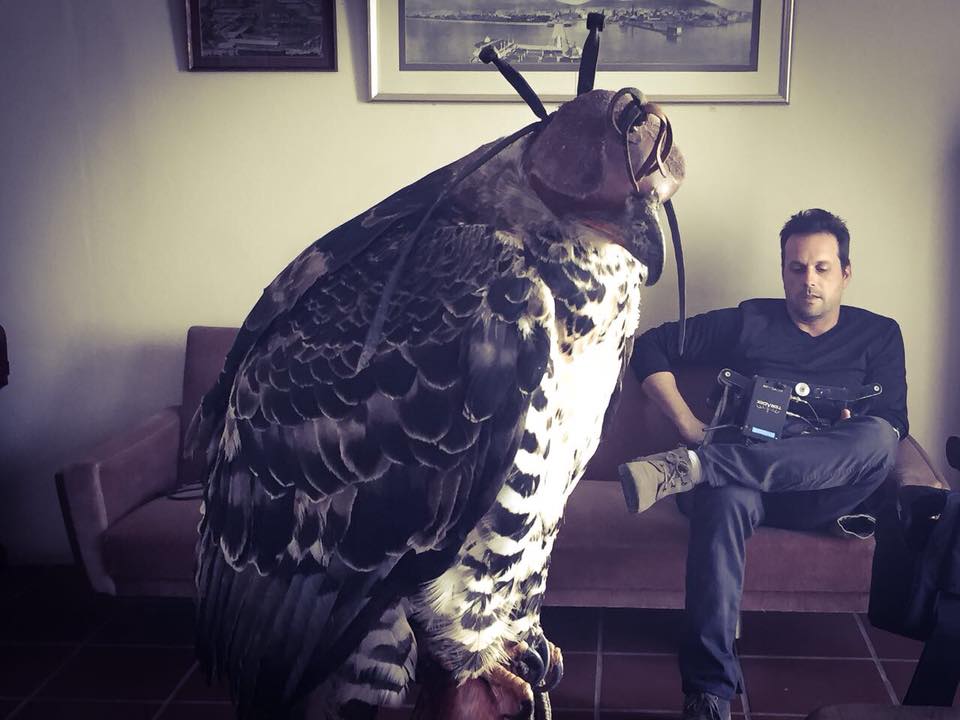
Several years ago, husband and wife filmmaking team Revere La Noue and Elisabeth Haviland James were in the wilds of Arkansas making a documentary about the ivory billed woodpecker, when inspiration struck for another film.
“One of the searchers was a falconer, and we saw him hunt ducks with a peregrine falcon,” La Noue recalled. “A little later, I saw imagery of falconry in the Middle East and connected the dots as it being something practiced all over the world.”
That realization transformed into a five year, four continent adventure to shoot “Overland,” the couple’s newest documentary, which will be screened as part of the 13th annual Hamptons Doc Fest running virtually from December 4 to 13. “Overland,” which took La Noue and James an additional year to edit, follows three very different falconers from diverse parts of the globe who have one thing in common: their passion for working with birds of prey.
[caption id="attachment_103585" align="aligncenter" width="600"] Revere La Noue with Dart during filming of "Overland."[/caption]
Revere La Noue with Dart during filming of "Overland."[/caption]
Khalifa Bin Mujren and his brothers live in Dubai in the United Arab Emirates (UAE) and are at the top of the falconry game. Their falcons are not used for hunting, but racing in high-stakes events. Descended from Bedouins, the brothers are doing what they can to maintain a traditional way of life at the edges of Dubai, a booming, high-end city that now boasts the world’s tallest skyscraper.
Conversely, Giovanni Granati lives alone on a farm in a remote part of Abruzzo, Italy. Surrounded by his wolves, horse and hawks, his is a back-to-basics lifestyle, and through a simple existence, he strives to escape the trappings of modern life. When his young son, Angelo, comes to visit for the summer, Granati teaches him the art of falconry in an effort to expose him to a technology-free way of being. Granati’s hero is Frederick II, a 13th century Holy Roman emperor and an experienced falconer who wrote the first treatise on the subject, which is housed in the Vatican library in Rome.
Finally, Lauren McGough has a Ph.D. in anthropology and hails from Oklahoma, but her passion is rehabilitating eagles that have been injured through interactions with humans and teaching them to hunt so they can survive on their own again. Her mission has taken her to some of the most remote corners of the planet to work with her birds. The film follows McGough, a falconer since the age of 14, to Mongolia, where nomadic populations show her how to hunt with eagles from horseback, and South Africa where she attempts to teach her eagle to catch prey and conducts research on the skull of an early hominid ancestor — a likely victim of a raptor attack.
[caption id="attachment_103586" align="aligncenter" width="600"]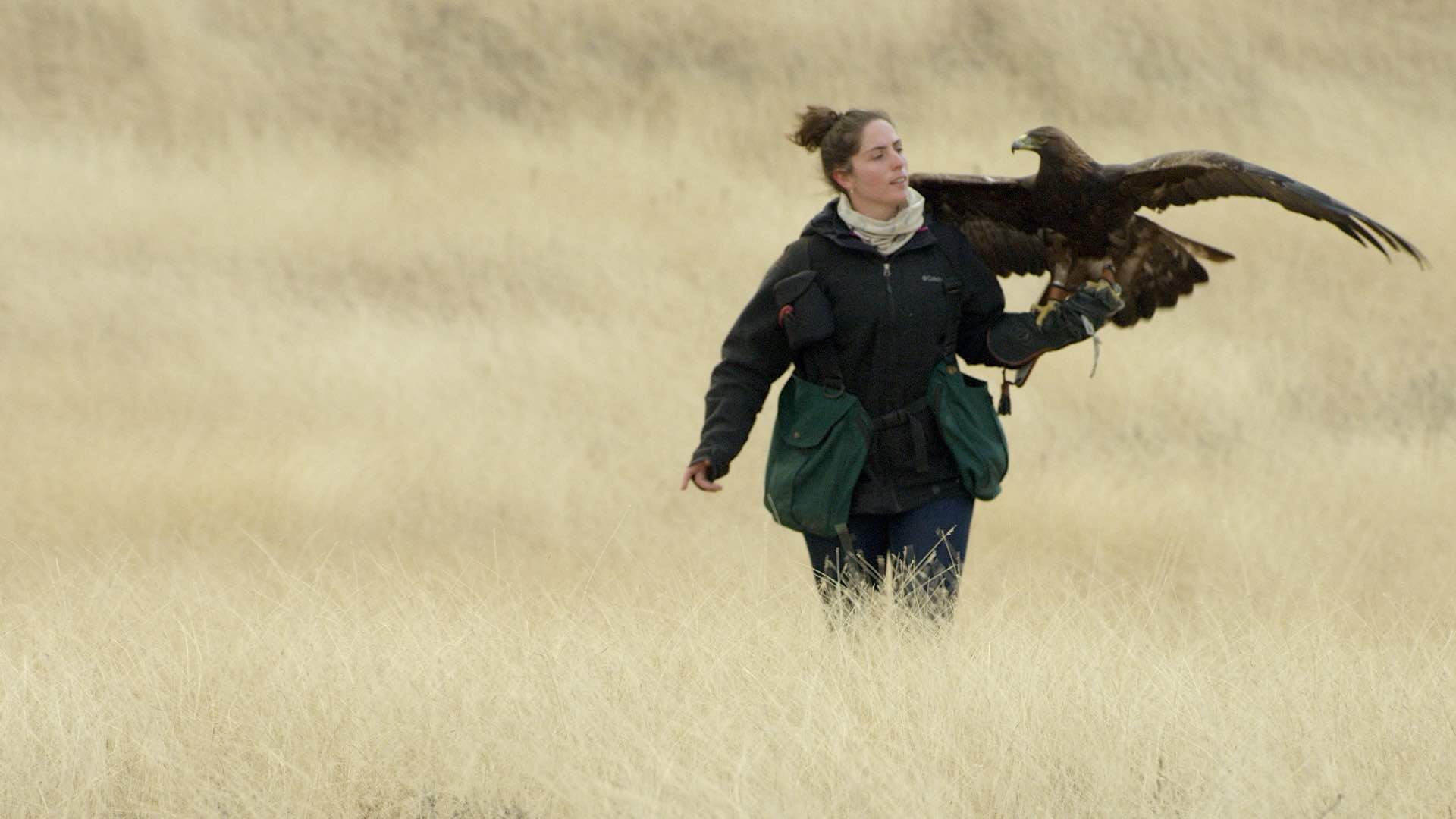 Lauren McGough with Miles the golden eagle in Oklahoma.[/caption]
Lauren McGough with Miles the golden eagle in Oklahoma.[/caption]
“As people who aren’t hunters ourselves, the love they have for the prey is parallel to what they have for the raptor,” James said of the film’s subjects. “Without one, the other can’t survive. That drew us to all three — and the fact they all did something very different with their birds. One has a long cultural heritage, another is partnering to work through past traumas and bond with his son, and the third is a woman who is a modern day adventurer who uses birds to explore the wild.
“We met a lot of different falconers making the film, but these three stood out, and that was important,” she added. “We wanted to have them sit next to us during the movie and feel proud to be in it.”
To the untrained eye, it may appear as if the birds these falconers keep are pets, but James points out that their relationship is much different and more complex than that of a typical pet owner.
“They’re not domesticated in a way a dog or cat is,” she explained. “The birds in our film have retained their wildness. I think trust is a huge part of it. Some falconers say if you mistreat a bird one time, that relationship is unrepairable. It can fly off with the prey. You’re nurturing it to be wild and to get the bird to perform. The biggest compliment a bird can pay is to hunt for you.”
[caption id="attachment_103587" align="aligncenter" width="600"]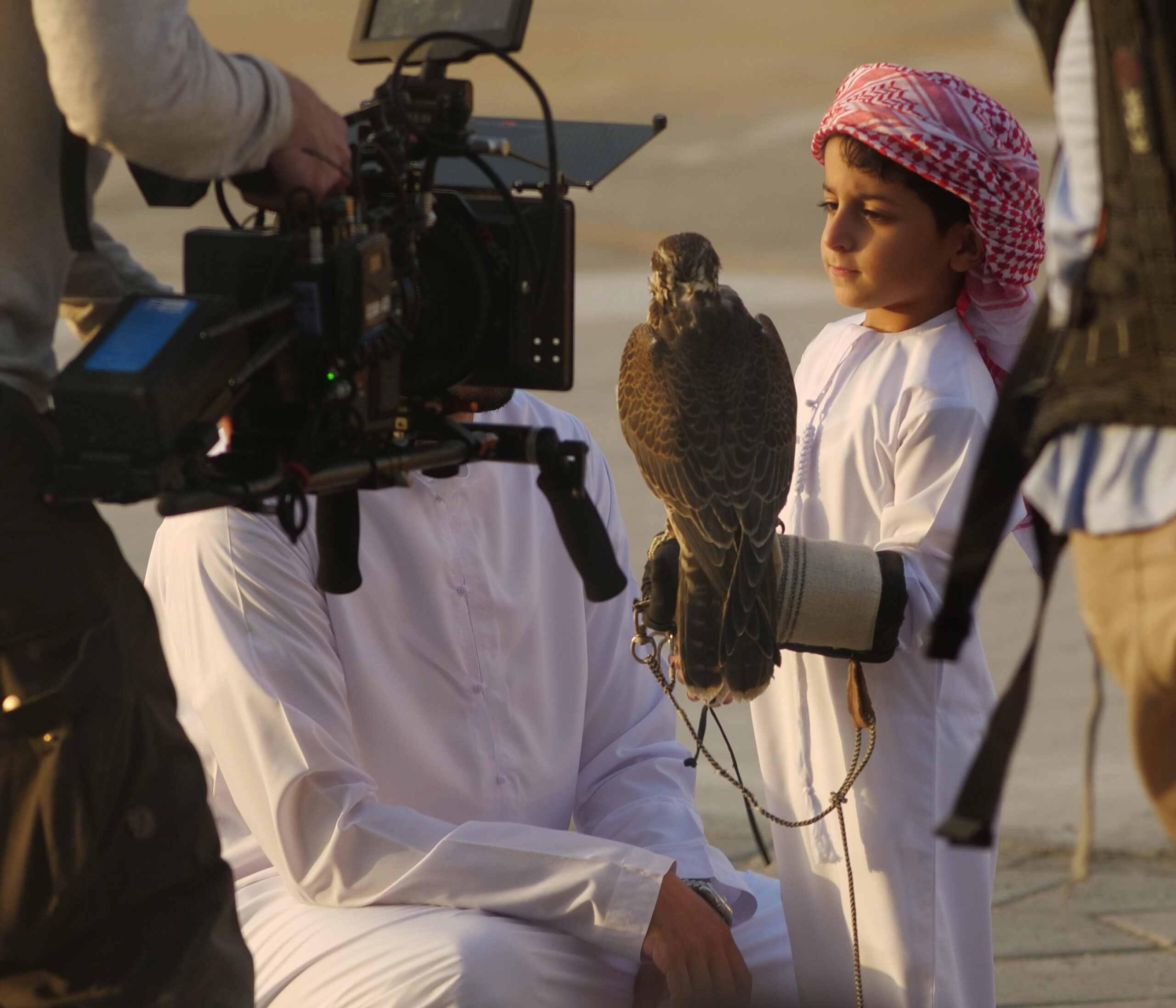 A young boy with a family falcon in Dubai.[/caption]
A young boy with a family falcon in Dubai.[/caption]
It’s estimated that the practice of falconry dates back 5,000 to 6,000 years, and while there’s debate over whether it began in Persia or Mongolia, what is clear is that initially, it was not sport, but survival that prompted humans to team up with birds of prey.
“The thought was, ‘What if I could partner with that bird and benefit from its ability to catch a hare?’” James said. “For Khalifa and his brothers, it’s certainly one of the largest cultural heritage components they have. Until the 1960s, there’s was a Bedouin culture. They were not building colonies, but moving with the prey.”
“When you see Khalifa with his Ray Bans and white robes, you don’t see the fact that his grandfather was a tribesman, using camels for transport until 30 years ago,” Le Noue added. “Now Dubai has the tallest building in the world. There’s no physical thing for them to hold onto, which is why they race falcons.”
James noted that because there is not a lot of prey left around Dubai to hunt, the brothers now pass their skills on by training their children to race the birds.
“They race in the sheik’s league, which is like the NFL,” James said. “You have to treat the bird in the same way as a hunting partner — if it loses confidence, it won’t race. As we followed Khalifa through a couple racing seasons, we saw how innovative he is. He’s a big deal — like the Michael Jordan of falcon racing.”
“Khalifa was the first subject that we decided on,” La Noue added. “We spent time with different falconers, but Khalifa was so successful and had such a bond with his birds. He was very gentle, and with their Bedouin origins, we saw it as an important story to share with American audiences.
“We had conversations on family, history and culture, and he understood we were in it for something deeper than a news show or a commercial,” he said. “One day, when we were done filming, we thought it was a wrap, and then his brother said, ‘You don’t want to shoot the falcon coming through the sunroof of the car?’
“They helped us out recognizing many cool moments.”
Covering three falconers as they traveled to work with their birds meant that James and La Noue were on the road a lot during the multi-year shoot. From Dubai to Kansas to Italy, and on to South Africa, Azerbaijan and Scotland, the couple let their three subjects set the lead.
[caption id="attachment_103588" align="aligncenter" width="600"]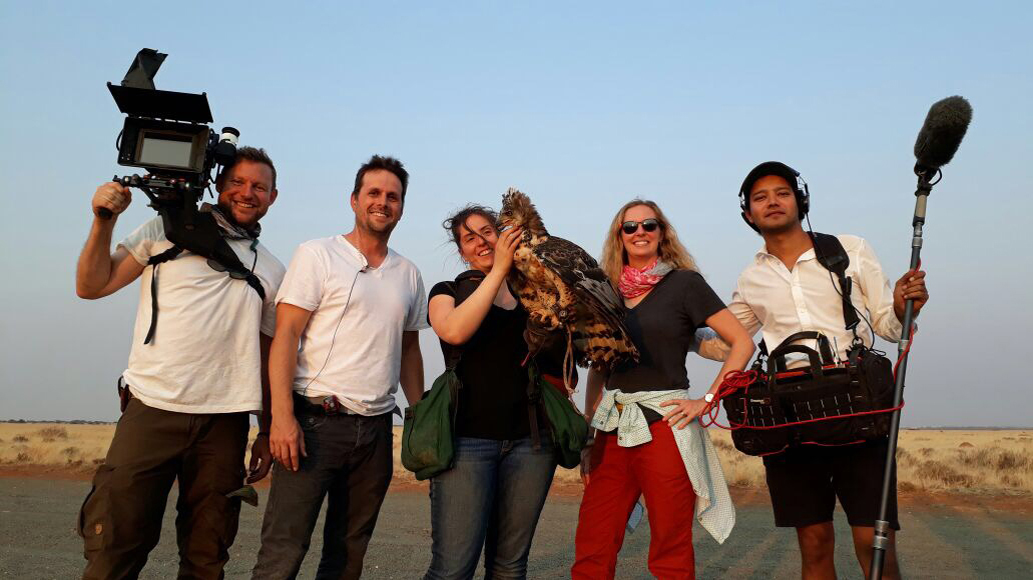 The filmmaking team on location with falconer Lauren McGough.[/caption]
The filmmaking team on location with falconer Lauren McGough.[/caption]
“Each shoot — there were seven in total — was seven to 10 days. There was no overview of how many shoots we would do, but we followed what the falconers were up to and followed the story that way,” La Noue noted. “We finished once we felt we had a bit of an arc in terms of closure, and frankly, no more money. We made the film totally independently and raised the money for each shoot and then started over. I think we did make an expensive movie for not much money.”
The filmmakers are based in Durham, North Carolina — they moved there from Brooklyn more than 12 years ago — and James was the producer and editor of Nancy Buirski’s film “The Loving Story,” which was screened by the Hamptons Doc Fest in 2013. James handled a lot of the logistical work on “Overland,” which she said she enjoys, but also finds stressful. For example, when Granati told her that it was his dream to see Frederick II’s falconry book at the Vatican, James set out to make that happen.
“It was a huge feat — it took two-and-a-half years to get into the Vatican,” she said.
Also not an easy feat was working with animals, and James noted that the difficulties the handlers experienced with their birds often brought about the best, most insightful moments in the film.
“So many of the moments just happened because we were in the right place at the right time. When a film involves wild animals, you have to be willing to drop your plans and do what the animal wants to do,” James said. “You learn to be flexible and proactive and reactive as directors. There’s what we wanted to achieve and what reality throws at you.”
One of the difficulties came with Miles, McGough’s golden eagle, who, during the course of the shoot, wasn’t catching anything while hunting. Though McGough was frustrated by Mile’s inability to perform on film, James noted it reflected real life, and McGough’s frustrations are familiar ones for anyone who has trained an animal or raised a child.
“Over five years, our stories were able to marinate and develop,” said James. “The early shoots were the most tenuous. In all three cases, they wanted to show us the magic, but you can’t script that. They were worried they were disappointing us. But the best part of the movie is where it doesn’t go as planned. They’re so connected to things in nature, when you have a film crew following you through a swamp or woods, throw in a cameraman and sound man it’s distracting.”
“It was a bit unique in that the three falconers were reluctant participants,” added La Noue. “These were three extremely introverted people who bond with raptors. Lauren was cooperative and engaged as a friendship developed, but having a film crew behind her was frustrating … She had to move slower than she wanted. There was also pride, and every time her eagle missed, she felt bad.”
[caption id="attachment_103584" align="aligncenter" width="600"]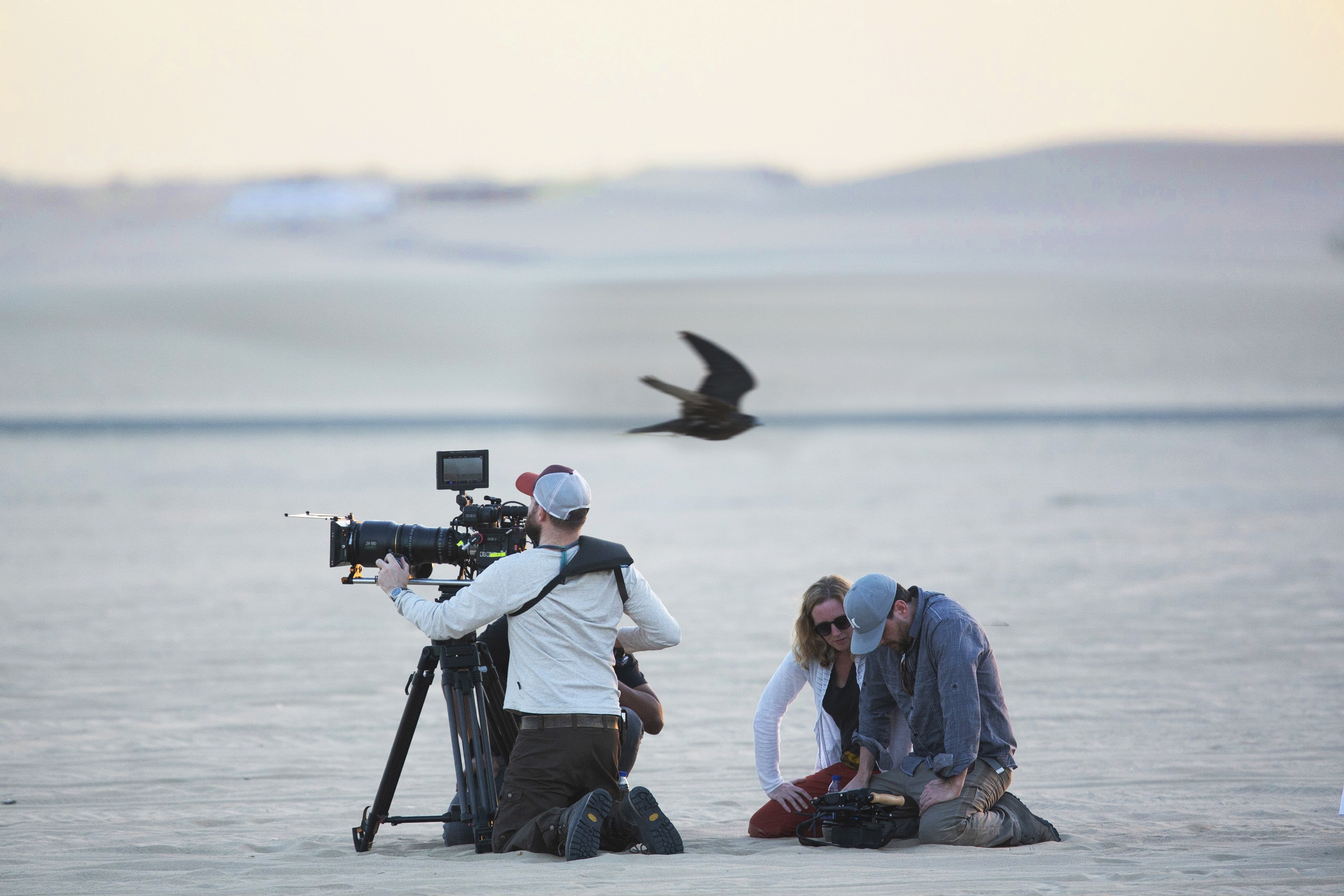 Directors Revere La Noue and Elisabeth Haviland James in Dubai with director of photography Benjamin Pritchard.[/caption]
Directors Revere La Noue and Elisabeth Haviland James in Dubai with director of photography Benjamin Pritchard.[/caption]
In terms of shooting logistics, prior to filming, either James or La Noue would travel to the location to scout settings and lay the groundwork before the rest of the crew arrived. James recalls meeting with Granati in Italy and making plans for the shoot near his farm.
“My Italian was no better than his English, but he was so magnanimous about what he had to say about the world,” James said. “He said, ‘Let’s go to this castle.’ I thought there would be lots of tourists, but Americans don’t travel to Abruzzo and there were not many. He has these wolves and his birds were flying, I knew we would have an amazing day.”
In addition to their own cinematographer, Ben Pritchard, the couple worked with drone teams all over the world to capture bird’s-eye-views of the terrain.
“I was proud that on all our shoots, we worked with local crews and rounded out the team with people from the region, incorporating people from the culture,” James said. “We worked long days in crazy locations with natural beauty. A gift to us was that we developed long-term relationships that will serve us through our career.”
Though COVID-19 has sidetracked the couple’s goal to get the film shown on a large number of big screens, this past January, prior to the pandemic, James and La Noue were able to do just that when they premiered “Overland” at the Santa Barbara International Film Festival, where it enjoyed three screenings, all of which received standing ovations. Also in attendance were McGough and Granati, who came to the festival with their birds of prey.
“We’re confident it will find its audiences,” said James, who encourages Hamptons Doc Fest viewers to watch the film on as large a home screen as possible so they can appreciate the expansive flying sequences. “It’s different than anything else out there. It’s not a social justice or a nature or a portrait film — but it’s sort of all those things wrapped into a story about an ancient art. This pandemic is making us take stock in each other, nature and the wild and connect to the places we would like to travel to.”
Ironically, as a husband and wife filmmaking team, James said that in recent years there were occasions when she and La Noue reached out to Sag Harbor’s own famed husband and wife documentarians for guidance — the late D.A. Pennebaker and Chris Hegedus.
“We asked Penny and Chris for advice on how to work as a husband and wife film team,” James recalled. “Penny said, ‘Whenever there’s an argument, Chris is right.’”
The 13th annual Hamptons Doc Fest is all online and has been expanded from five to 10 days, with a full slate of 35 documentaries running virtually from December 4 to 13. Individual film tickets are $23. Festival passes are $125. To stream “Overland” or any of the other films, visit hamptonsdocfest.com.